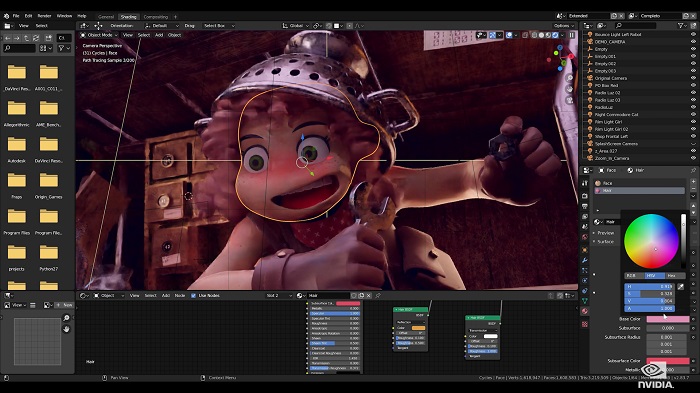By Gina Roos, editor-in-chief
Many, if not all, of the largest electronics industry events in 2020 — including APEC, OFC, MWC, and now EDS — have been cancelled or postponed due to the global COVID-19 virus outbreak . This has led the industry to rethink online events, with many electronics component suppliers and distributors moving their technical presentations and product launches to the virtual world.
One of the latest is Nvidia, which is kicking off its GTC Digital online event on March 24. GTC is typically a five-day event in San Jose. The company will highlight the latest advances across several technology segments, including artificial intelligence, high-performance computing, robotics, and autonomous vehicles.
Nvidia said that it gave refunds to everyone who purchased a GTC 2020 pass, which was converted to a GTC digital pass. Passholders can log into the event with their GTC 2020 credentials. Anyone else can attend with free registration .

Blender, an open-source 3D software package, comes with the Cycles Renderer, a GPU-enabled path tracer, now with the latest generation of Nvidia RTX GPUs with AI features such as the OptiX denoiser.
Although most of the digital content is targeted for a technical audience — data scientists, researchers, and developers — the event will also host high-level talks, tech demos, and podcasts on various topics. Most of the content will be available to the global community at no cost with the exception of some instructor-led, hands-on workshops and training sessions, which require a small fee.
- Seven full-day, instructor-led workshops, from March 25 to April 2, on data science, deep learning, CUDA, cybersecurity, AI for predictive maintenance, AI for anomaly detection, and autonomous vehicles. Each full-day workshop costs $79.
- Fifteen 2-hour training sessions running April 6–10, on various topics, including autonomous vehicles, CUDA, conversational AI, data science, deep-learning inference, intelligent video analytics, medical imaging, recommendation systems, deep-learning training at scale, and using containers for HPC. Each 2-hour instructor-led session costs $39.
- Live webinars: Seventeen 1-hour sessions, from March 24 to April 8, on various topics, including data science, conversational AI, edge computing, deep learning, IVA, and autonomous machines. Live webinars will be converted to on-demand content and posted within 48 hours. Free.
- Connect with experts: Thirty-eight 1-hour sessions, from March 25 to April 10, in which participants can chat one-on-one with Nvidia experts to get answers in a virtual classroom. Topics include conversational AI, recommended systems, deep-learning training, and autonomous vehicle development. Free.
In response to the cancellation of APEC 2020 in North America, power electronics manufacturers also moved their exhibits and technical demos to the virtual world. Power Integrations (PI) and Texas Instruments (TI) are two of the first to move their product launches online.
PI’s virtual booth showcases all of its technical presentations and product demos that were originally planned for APEC 2020. These include its PowiGaN gallium nitride technology, BridgeSwitch BLDC motor drivers, SCALE-iDriver SiC gate driver solutions for automotive and 900-V switcher ICs for regions with unstable mains voltage. In addition, nearly 20 design example reports can be downloaded from the site.
At TI’s virtual booth, the company provides information on its latest products, including a new DC/DC buck converter and 4-A power module, along with several video demos.
Distributors are also moving events online. Arrow Electronics recently announced that it will hold a virtual technology exhibition, Arrow Embedded To Go, April 1–3, in which visitors will have direct access to Arrow’s sales and engineering teams. They will also have a chance to obtain one of 3,000 free development boards. There is no cost for the event, but you must register for access.
Additional virtual events will be added as they become available, so check back often.
Advertisement
Learn more about Electronic Products MagazineTexas Instruments





